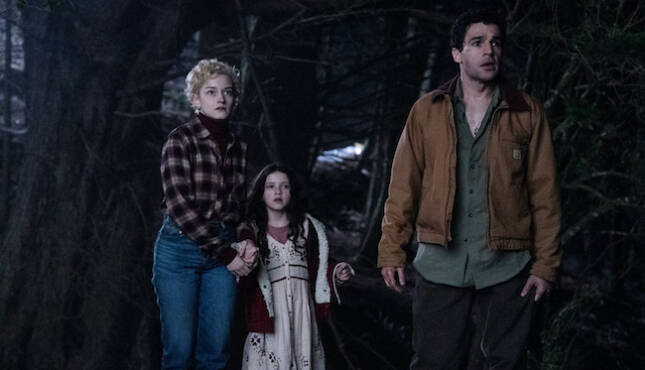Movies & TV / Reviews
Wolf Man Review
 Image Credit: Nicola Dove/Universal Pictures
Image Credit: Nicola Dove/Universal Pictures

Directed By: Leigh Whannell
Written By: Leigh Whannell and Corbett Tuck
Runtime: 103 minutes
MPA Rating: Rated R for bloody violent content, grisly images, and some language.
Christopher Abbott – Blake Lovell/The Wolf Man
Julia Garner – Charlotte Lovell
Matilda Firth – Ginger Lovell
Sam Jaeger – Grady Lovell
Leigh Whannell revisits another iconic property hailing from the classic Universal Monsters catalog with Wolf Man. Following his previous success with 2020’s Invisible Man, the filmmaker opts for a grounded and gritty approach for his modern update on the cinematic horror luminary. Whannell’s new iteration of the horror classic showcases an average family thrust into a terrifying situation. It alters the lupine affliction that plagued Lon Chaney Jr.’s Larry Talbot in the classic 1941 feature from a supernatural curse to a debilitating, infectious disease.
The film begins depicting the childhood of Blake Lovell living under the strict supervision of his austere, overly authoritarian father, Grady (Jaeger). During a seemingly routine hunting trip near their rural Oregon property, Blake and his father experience an eerie encounter with a feral individual, more closely resembling man than beast, a local urban legend dubbed “the face of the wolf.”
Fast forward to thirty years later, the now adult Blake is between jobs and functioning as a stay-at-home dad for his daughter, Ginger (Firth), with Blake’s wife, Charlotte (Garner), working as a journalist and the family’s primary breadwinner. Blake receives notification that his estranged father has been declared legally dead after previously going missing. Blake convinces Charlotte to accompany him and Ginger for a family outing to his father’s farm to pack up his old things, believing getting out of the city for a while would help their family. On the way there, they narrowly miss running into the feral wolf man, who stalks the Lovell family and makes them its new prey. During the chase, it appears Blake sustains a wound from the creature, and now the face of the wolf ailment begins to transfer over to him as well. As the sickness takes hold, Blake loses his grasp on his humanity, and he desperately attempts to hold onto his attachment to his family as the creature stalking the farm seeks to finish them off.
Whannell co-writes the film’s script with his wife and writing partner Corbett Tuck, and they take an interesting approach to the werewolf affliction Blake suffers from, imbuing the story with more of a sci-fi body horror angle. Blake’s transformation into a feral wolf man unfolds throughout the narrative as a gradual, torturous slow burn rather than a single show-stopping sequence. The terror comes not so much through the presence of the Wolf Man, but in how Blake’s transformation gradually strips away his humanity and emotional connection to his family. Blake soon loses his ability to speak verbally, and his wife and child’s words are heard as verbal gibberish as Blake’s human understanding deteriorates.
Wolf Man falls short with its human characters. Despite presenting a pared-down, intimate human drama, the characters lack emotional punch and heft. Their emotional arcs are woefully underdeveloped. Charlotte and Blake’s marriage is portrayed as very cold and distant. While emotional distance is probably not unusual for a marriage, the relationship never shifts out of that original mode throughout the film. Garner’s performance plays as unusually passive throughout the narrative, even when her family becomes thrust into a life-or-death crisis. Perhaps she’s in shock, but it is difficult to grow invested in the characters or their fates when they act so cold and unemotional. During a pivotal scene in the movie, Charlotte voices her love for Blake, but it never rings true.
The problem with the film’s intimate, minimalist style and setting is that the story heavily relies on the lead actors to bring the story home. However, Blake and Charlotte never ignite the screen with their romance or passion, especially when the story concerns a family’s tragic loss dealing with an inevitable fate. Their characterizations and personalities feel paper-thin, and they lack any discernible romantic chemistry.
To Abbott’s credit, he exceptionally handles the physicality of his role. He executes the moments of the shock and horror of one’s humanity transforming into something wild and feral. Whannell opts for convincing practical makeup and effects work, along with an impressive physical performance by Abbott that showcases Blake’s agony and pain as the lupine disease spreads. These are the film’s best moments, which would be welcome in a more refined script with more developed lead characters.
Ultimately, there are elements to like in this modern Wolf Man update. It brings some refreshing ideas to the premise, and Whannell provides decent directorial flourishes. However, the story and characters never come alive, feeling too flat and dispassionate considering the horror as it unfolds.








